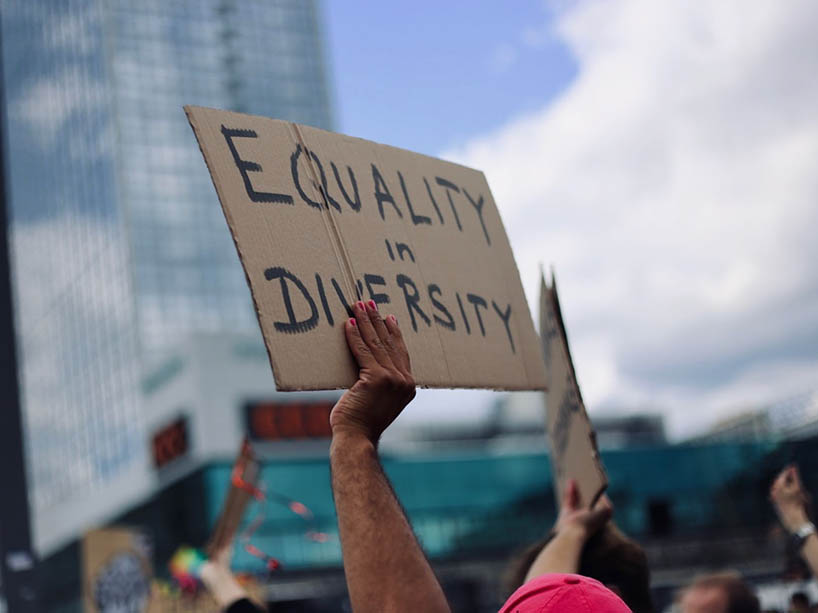This Remembrance Day, explore the connection between conflict and human rights

History professor and human rights historian Jennifer Tunnicliffe will speak at TMU’s Remembrance Day ceremony this year, on the eve of the 75th anniversary of the Universal Declaration of Human Rights.
Remembrance Day is fast approaching, and this year, the TMU community is invited to gather on November 10 in the Quad to commemorate the end of World War I and pay tribute to the sacrifices made by those who served and those who continue to lose their lives in conflict.
But this year’s speaker, Jennifer Tunnicliffe, professor of History in the Faculty of Arts, and human rights historian, also wants to reflect on the relationship between global conflict and human rights. December 10 marks the 75th anniversary of the Universal Declaration of Human Rights (UDHR), adopted by the United Nations General Assembly. On Remembrance Day, Tunnicliffe will lead the TMU community through a reflection on what this document means, 75 years later.
Developing the Universal Declaration of Human Rights
In 1946, the United Nations General Assembly established a commission tasked with drafting an international bill of rights. The first component of this, a declaration of universal human rights, has since become a cornerstone of international human rights law, providing an aspirational set of fundamental rights and freedoms that are inherent to all individuals.
Although the human rights movement gained traction before the Second World War, Tunnicliffe says the explicit connection between the war and the ideas of freedom and rights, coupled with the human rights abuses that occurred in Canada during that time, including the internment of Japanese Canadians, led to a surge in activism within Canada.
Canada’s shaded history of human rights
In her research, Tunnicliffe found that Canada resisted and opposed the United Nations’ first documents, including the UDHR and the subsequent international covenants on human rights. “Contrary to the way that the Canadian government presented itself – as a country that didn’t have an issue with discrimination – the Canadian government was actually resistant in the 1940s and 1950s to the establishment of international human rights law,” she says. “And there are two main reasons for this: our human rights tradition follows the British rights tradition, which is largely unwritten, but was believed to provide sufficient protection. It wasn’t until 1982 that we got an enshrined Charter of Rights and Freedoms,” she says.
The second reason leaves us with more to confront. “But another important aspect is the very real history Canada has with settler colonialism in regard to its policy toward Indigenous Peoples, as well as racial segregation, tremendous discrimination towards people of colour and women,” says Tunnicliffe. “There was a real concern that the UDHR would demonstrate the extent to which Canadian policy did discriminate and that the Canadian government wouldn't be found to be adhering to all of the rights outlined in the document.”
Reflecting on human rights, 75 years later
In talking with her students about the history of human rights, Tunnicliffe says she poses the question to them: given its history, what meaning does the UDHR have today?
TMU’s Remembrance Day ceremony gives the wider TMU community the chance to reflect on the same question.
“On the 75th anniversary, it's important for us to remember that this document emerged from a time in which the world community recognized that war comes in part because our human rights are violated, because people are oppressed, and that there's a really important connection between human rights and peace.”
This anniversary is also an opportunity, says Tunnicliffe, to reflect on the contemporary human rights challenges we’re seeing and consider how the fight for human rights is an unfinished project. “Despite the fact that human rights are talked about in a universal way, we all have different ideas of what human rights mean,” says Tunnicliffe. “It’s important to remember that human rights are fragile, and that it's not enough to just pass a document in 1948 and say, now we have these rights. We have to continue to think about how we understand universal human rights and to expand it to include ideas from the widest array of people.”
The struggle continues
As the TMU community gathers together to mark Remembrance Day this year, Tunnicliffe wants to encourage us all to be reflective about how we can move forward to a world that’s more socially just. “Consistently, we’ve seen human rights be leveraged as a political tool,” says Tunnicliffe. “Sometimes people talk about them as a sword to be wielded. You hear ‘it's my right to do this,’ and rights are being used all the time to justify violations of rights,” she says.
Tunnicliffe urges us to stop seeing human rights as a pie, with only so many slices to that pie. “Someone else getting rights doesn’t take away from the rights that I have,” she says. “The more people that have rights, the more freedom we have.”
Nowadays, Tunnicliffe derives hope about the future and the ongoing struggle for human rights from her students. “When I see the level of activism that my students engage in, and the discussions we have together, I feel hopeful.”
The entire TMU community is encouraged to join in the university’s Remembrance Day ceremony on November 10 in the Quad, to commemorate the UDHR and the work ahead. “My hope is that the 75th anniversary isn’t just celebratory but that we begin to look more critically at the history of human rights in Canada,” says Tunnicliffe.
Related stories:
